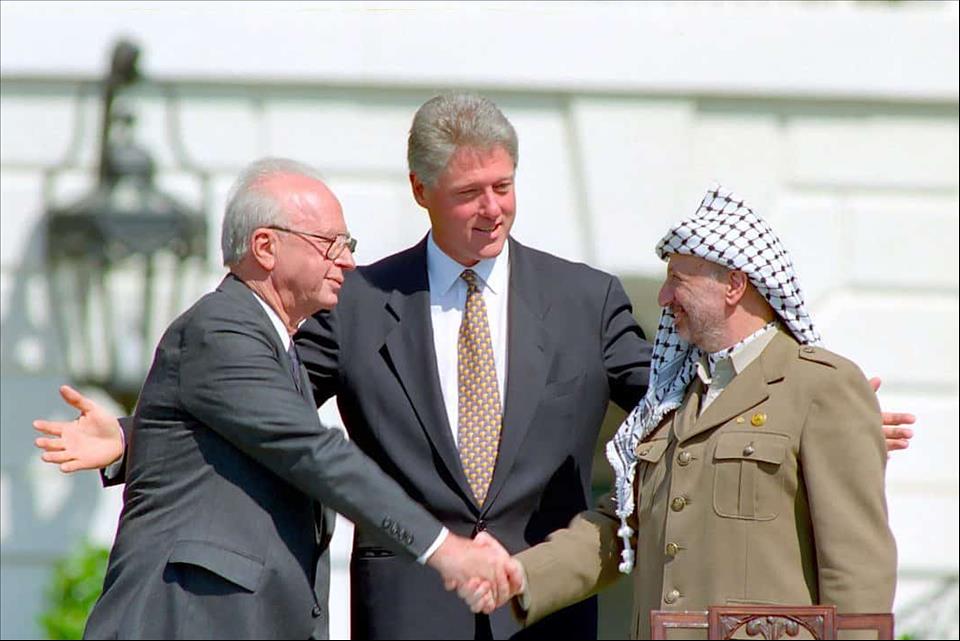
How America Helped Create The Palestinian Authority Only To Undermine It Ever Since
Historically, the US has also supported the PA. The Oslo accords, which created the PA in the first place, were signed at the White House in 1993. US president Bill Clinton famously hosted Israeli prime minister Yitzhak Rabin and the chair of the Palestine Liberation Organisation (PLO), Yasser Arafat.
In discourse that has since become standard US policy, Clinton spoke of a so-called“two-state solution”, with security for Israel and democratic self-rule for the Palestinians. The US provided significant financial support for the PA after its establishment, with particular funding for its ample security forces .
Yet behind the scenes, the US stance on Palestinian statehood has always been murkier. A deeper look shows that the Trump administration's recent moves blocking the PA are less of a departure from long-term US policy than they may seem. As I explain in my new book A Short History of the Gaza Strip , the US has long paired its ostensible support for the PA with policies that cripple its ability to function and undermine prospects of real Palestinian independence.
From the start, the Oslo accords were skewed in favour of Israeli interests . Under the agreement's terms, the PA had limited autonomy over around three-quarters of the Gaza Strip and less than one-fifth of the West Bank . The Israeli military retained ultimate control and continued to seize more land for illegal settlements .
At the end of the 1990s, Clinton aligned himself closely with the new Israeli prime minister, Ehud Barak. Barak's declared“red lines” included no Palestinian state along the 1967 borders , no Palestinian national army, no Palestinian sovereignty over any part of Jerusalem and the retention of most illegal Israeli settlements in the West Bank.
Further negotiations were structured to constrain the Palestinians, culminating in the “failure” of the 2000 Camp David summit . Familiar to anyone who has followed Israeli-Palestinian affairs, Arafat has been blamed for refusing Barak's“unprecedented” proposal. The reality is somewhat different.
As Robert Malley and Hussein Agha wrote in their 2001 book, Camp David: a tragedy of errors ,“what so many viewed as a generous Israeli offer, the Palestinians viewed as neither generous, nor Israeli, nor, indeed, as an offer”. Malley served as adviser to Clinton on Arab-Israeli affairs while Agha, a senior associate member of Oxford University's St Antony's College has been associated with Israeli-Palestinian affairs for more than half a century – meaning they know whereof they speak.
The US' disingenuous approach did not end when Clinton left office. During the second intifada (Palestinian uprising) from 2000-2005, the administration of George W. Bush backed Israel's full invasion of PA-administered areas in the West Bank and Gaza. This completely undermined any chance of a two-state solution – the very“solution” that the US ostensibly supported.

Second intifada, October 2000: Palestinian protesters confronting Israeli security forces near Ramallah. Ganot (נדב גנות) / IDF Spokesperson's Unit , CC BY-NC
In 2003, the US demanded a full restructuring of the PA's set-up to curtail Arafat, whom Palestinians had elected president in 1996. When he died in 2004, he had spent two years under Israeli siege in Ramallah – another policy supported by the US .
Two years later, US moves to undermine the PA reached a crescendo when the 2006 Palestinian parliamentary elections returned Hamas as the largest party with 44% of the vote . While the elections were deemed free and fair by international observers , the Bush adminstration responded by plotting, arming and funding a coup to overthrow the new PA government.
In the end, the coup backfired, resulting in a lasting split from 2007 when Hamas seized control of Gaza and Abbas' forces purged it from the PA in the West Bank. Since then, Palestinians in the two territories have been largely cut off from one another under two separate regimes. Abbas' PA has been based in the West Bank while Hamas governs Gaza – where Israel has imposed a full blockade from 2007, supported by the US and Egypt.
No authorityIn the two decades since, successive US administrations have effectively facilitated the Palestinian divide. In 2014, the Obama administration backed Israeli opposition to a short-lived Palestinian unity government . And when Abbas cancelled long-awaited Palestinian elections in 2021, the Biden administration stayed silent, with reports of tacit US support for the move behind the scenes.
UK prime minister, Keir Starmer, welcomes Palestinian Authority president, Mahmoud Abbas, to Downing Street. But will the UK go ahead with its pledge to recognise Palestinian statehood later this month? EPA/Tolga Akmen
While many western and Arab states are calling for the PA to take over Gaza's future governance, critics point out that it has long been toothless and illegitimate .
Elected in 2005, Abbas is now 20 years into a four-year term. What's more, his regime has delivered little for West Bank Palestinians in the nearly two decades since the split from Gaza.
He has been entirely ineffectual in countering the Israeli war on Gaza, launched after the Hamas-led attacks of October 7 2023 and widely recognised as genocide . As ministers call to resettle Gaza , Israel has continued to expand its illegal settlements in the West Bank and is openly planning ethnic cleansing .
It is important to remember that the PA was only ever created as an interim body, designed to serve for five years in the 1990s ahead of final negotiations. Its continued existence decades later is a serious indictment of the US-led so-called peace process. The reality of US treatment of the PA since the 1990s calls into question whether Trump's recent moves are really a turning point in US policy – or simply the culmination of a long-term trend.

Legal Disclaimer:
MENAFN provides the
information “as is” without warranty of any kind. We do not accept
any responsibility or liability for the accuracy, content, images,
videos, licenses, completeness, legality, or reliability of the information
contained in this article. If you have any complaints or copyright
issues related to this article, kindly contact the provider above.


















Comments
No comment